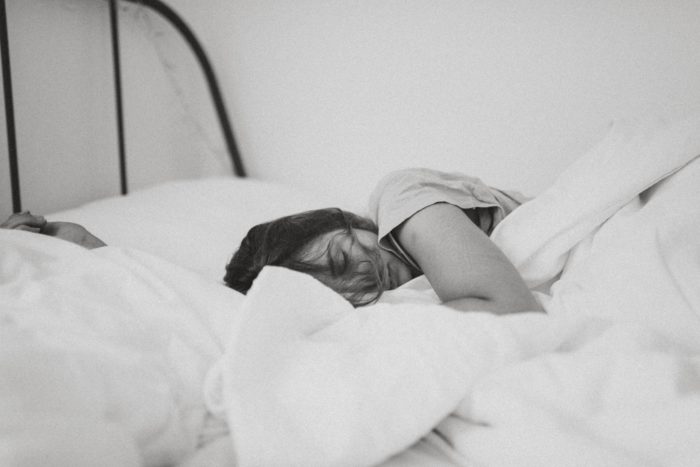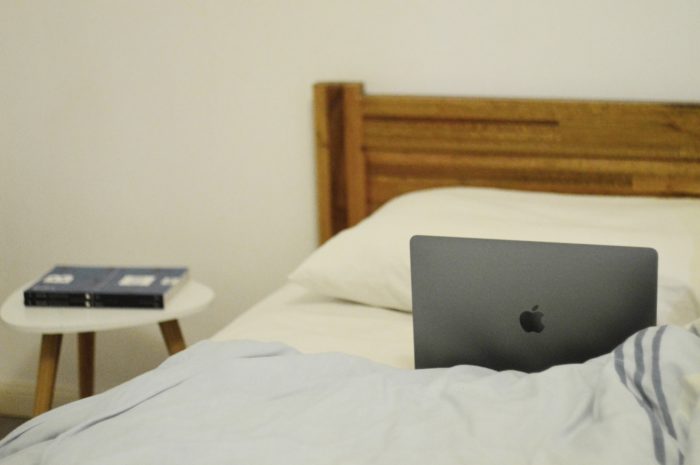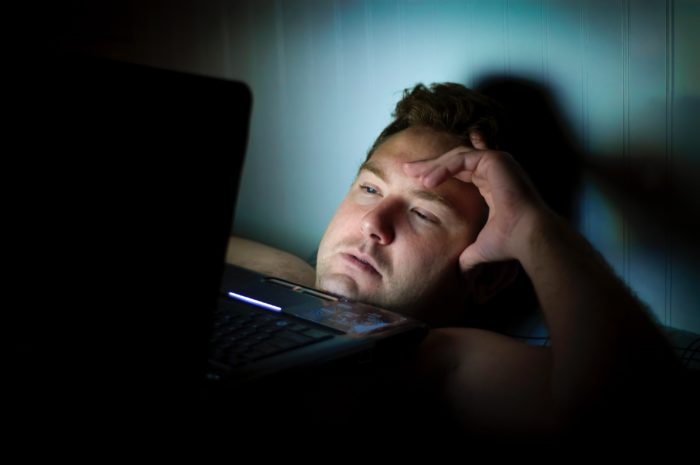
I feel exhausted, collapse into bed, have a quick scroll on Instagram, then turn off the light welcoming sleep. But, that’s not what happens. As soon as the light is off my brain feels the most awake it has all day. I am tossing and turning wishing for that sleep I so longed for hours before. When I finally do fall asleep, I find myself waking up periodically and when my alarm beeps in the morning I feel like I’ve only slept for four hours.
After a couple of weeks of this, I decided something had to change. I started a regular bedtime, that helped somewhat but still, I found myself lying awake for hours. I changed my bedsheets and shaved my legs hoping the deluxe comfort would lull me to sleep—no luck there.
Sleep hygiene could be the reason you’re not sleeping well
During my psychology undergraduate degree, I took a module in sleep. One lecture taught me about sleep hygiene and how it can seriously affect your ability to fall asleep, stay asleep, and/or get a good nights sleep. Sleep hygiene is basically different practices and habits that enhance your sleep making you feel more alert the next day.
Some of these practices are pretty obvious, like don’t drink caffeine or stimulating drinks close to bedtime, or don’t take long naps (more than 30 minutes) during the day. Others play on our susceptibility to classical conditioning like creating a regular bedtime routine. Creating a routine helps signal to your brain that it is time to start preparing for sleep.
Further to this, don’t use your bed for things other than sleep and other nighttime activities. Things like watching Netflix or working in bed can cause your brain to associate your bed with these activities rather than sleep. So if you want to binge on Orange Is the New Black you better get yourself set up on the sofa.

In order to get a good night’s rest, it is also important to change your everyday routine. Making sure that you expose yourself to enough natural light during the day and darkness during the night is vital for ensuring a healthy wake-sleep cycle. Working out also has a big effect on sleep. As little as 10 minutes of aerobic exercise in a day can improve sleep (but strenuous exercise too close to bed can inhibit sleep, it varies from person to person so experiment and find what suits your body best).
It was time to end my late-night scrolling
I decided that my sleep hygiene was pretty good. The only thing that tripped me up was watching Netflix in bed before going to sleep, or scrolling social media. It was time to implement a bedtime technology ban.
The idea that looking at screens at night is bad for us is nothing new. A lot of studies have shown that using our devices before bed has two negative effects on us. Firstly, looking at social media stimulates us meaning that when we finally try to sleep, our brain is buzzing. Secondly, and possibly most importantly, the blue light that is emitted from these devices signals to our bodies that it is not time for bed despite consciously thinking that it is. Blue light is inhibiting the release of the sleep hormone melatonin.
Blue light in itself is not bad for us. In fact, we get a lot of blue light exposure (far more than from our phones) from the sun. During the daytime, blue light helps us stay alert and awake. The problem is if we have blue light exposure at night our brain continues to stay alert even when we are trying to sleep.
It was time for me to wave goodbye to restless nights.

I settled on turning off my devices at least one hour before bed. This might seem difficult but research actually suggests that we should be reducing our blue-light exposure at least three hours before! During the first few days, I found it difficult not using my phone. I would mindlessly reach to get it, then consciously remind myself. My mind would come up with excuses as to why I needed to look at my phone—what if someone really needs me? What if I miss out on something? After getting used to it though, I put my phone on charge and completely forget about it.
I found that by putting my phone on do-not-disturb, having the same nighttime routine, and reading a book for an hour I fell asleep far quicker, didn’t have a restless night, and woke up feeling more energized. When I looked at Instagram or checked my emails before bed, my mind would be racing with what I had to do the next day or what I had to do to make a success out of myself. Once I stopped scrolling my mind became clearer. Sometimes I wake up and I don’t even remember what I was thinking before bed. I feel calmer and more relaxed than before.
I can tell as soon as I wake up in the morning that I have slept well. I feel ready to get out of bed straight away and get on with the day. I am able to concentrate better, work more productively and have the motivation to do a workout. I’m not saying if you change your sleeping habits your life is always going to be wonderful, because there are other factors that impact productivity and mood, but on the whole, if you improve your sleep you will see benefits in your mental and physical health.
How to reduce your blue light exposure
It isn’t always possible not to look at your screen in the evening before bed. For example, while I love reading actual books, sometimes that’s not practical. When I’m living in my van I don’t have the space for lots of books and so using my iPad as a Kindle is the best option. Fear not! You might have seen adverts for blue-light-blocking glasses everywhere recently. Using these could be the answer to late-night screen time. While they can’t block 100% of the blue light, they can reduce it massively allowing for more natural melatonin release and a better night’s sleep. This phenomenon is relatively new but research in adolescents found that these glasses did help improve sleep quality.
So, while I will still be saying no to social media an hour before bed, I’m willing to get myself a pair of blue light blocker glasses and get lost in a Kindle book.
Also by Louise: I Took A One-Way Trip To Live #Vanlife In Mexico. Why It’s So Liberating
I’ve Been In A Long-Distance Relationship For Years & Wouldn’t Have It Any Other Way
Get more like this—Subscribe to our daily inspirational newsletter for exclusive content!
__
Photo: Vishal Shanto on Unsplash; Matthew T Rader on Unsplash; Kinga Cichewicz on Unsplash




